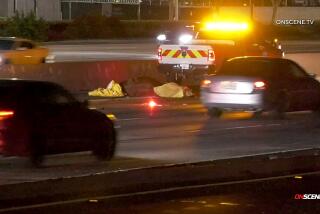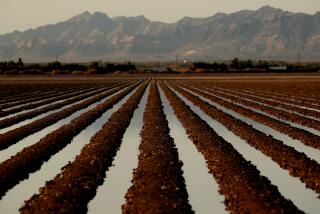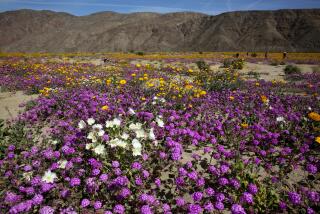Texas looks like Wild West as flooding forces a cattle drive
This small town looked like the Wild West on Sunday as people lined the highway to witness something not seen in these parts since the 1800s: a cattle drive, complete with cowboys, cattle dogs and Longhorns.
The cattle drive past Jack in the Box, Little Caesars and Family Dollar was a desperate effort to rescue more than 600 head of cattle trapped when floodwaters from the Trinity River inundated their pasture last week, turning it into an island.
“What we’re trying to do this morning is to herd the cattle over to Highway 90” and through town to temporary pasture on land volunteered by the railroads, Liberty County Sheriff’s Capt. Ken DeFoor said.
But that was no easy task.
“Those cattle have a mind of their own. When you’re taking them off of something that’s considered high ground and put them into water that’s up to their neck, it takes a little time. They have different opinions on what they want to do,” DeFoor said.
May has been the wettest month on record in Texas. The Houston area was drenched with more than a foot of rain over Memorial Day weekend, then with at least another 3 inches late Saturday. The storms, which extended into Oklahoma, killed at least 36 people in both states and left about a dozen still missing Sunday. Homeowners, drivers and livestock were stranded statewide.
A lot was at stake for the Liberty Bell Ranch’s million-dollar herd, which includes Longhorns, heifers and about 250 calves, some of which had to be rescued by boat Sunday.
As the cattle moved slowly through the water and up the highway, the crowd grew and a parade atmosphere reigned in Dayton, a town of 7,300 about 40 miles east of Houston.
Parents camped out with children and babies on tailgates in the Brookshire Brothers grocery store parking lot. People sold watermelons and ice cream. Some brought soft drinks from the nearby Sonic. A few stood atop their trucks for a better view as car radios blasted news of the approaching herd.
“It’s been a long many years since they done this, back when the highway was dirt,” said Jimmy Whiddon, 52, a retired steelworker waiting on his tailgate to see the cattle drive.
At one point, a news helicopter hovered overhead and spooked the herd, which split in two and had to be gathered again.
Whiddon worried how the cattle would act around children.
“These cattle have never been around children. All they know are pastures and hay. What these bulls do, the heifers will follow. I’m just hoping and praying to God these children won’t be hollering at them,” he said.
As the herd drew closer about 2:30 p.m., some children hopped into the street for a better view, but most stayed close to the trucks.
“Are the cows here yet?” some asked repeatedly.
Ricky Brown, 61, a tax assessor, grew up on a ranch and has worked with ranchers for years. He considered the cattle drive a “drastic step” to save the herd, which belongs to Pat Henscey, a veteran rancher who runs an electric and air conditioning shop in town.
With the state’s five-year drought virtually over thanks to the recent rain, ranchers are rebuilding their herds, restocking cattle and driving up the price — making Henscey’s herd even more valuable.
The cattle drive was risky. Water surrounding the herd was 6 to 10 feet deep, Brown said. Pictures posted online moments earlier showed calves struggling to swim across the moat of floodwater threatening to engulf their pasture.
“You’re dealing with wild animals that are not used to being captured.... Cattle are used to roaming, being free-range. It’s not natural for them to be in the water. I’m figuring what’s going to go wrong,” Brown said. “It will be interesting to see if he can salvage even half of his herd.... It kind of gives you an appreciation of how they did it in the old days.”
Alyssa Sjolander, 15, came to watch friends put their rodeo skills to use corralling the herd.
Billy Thacker, 55, brought sons Hayden, 5, and Bentley, 3, two energetic towheads in matching Wrangler cowboy jeans and ostrich skin cowboy boots. Thacker had seen a cattle drive at the stockyards in Fort Worth, but never through town.
“Who you reckon they’re going to get up behind them to sweep up all the poop?” Thacker said.
“You!” Hayden shouted, giggling.
Just then, shortly before 3:30 p.m., cattlemen began walking the curbs, warning the crowd to back up — the cows were coming.
Game wardens drove past, as did a firetruck with the driver shouting on a bullhorn: “The cows are rowdy — please return to your vehicles!”
Thacker and a few others backed up, but only slightly.
And then the cattle appeared: a solid mud-speckled bovine line moving as one up the highway, a dozen cattle dogs at their heels.
The crowd stilled, nearly silent. They watched the cows pass within arm’s reach, close enough to smell the manure and hear moos and grunts. Cowboys rode horseback alongside, some toting lassos.
Hayden and Bentley stared wide-eyed. After a few moments, Hayden took his younger brother’s hand. He held it until the last trailer passed, and Bentley let go to point at the few stray calves inside.
“They fight like cats and dogs,” their father said as he watched the boys. “But they take care of each other.”
No injuries were reported among the crowd, and the cattle kept to themselves.
“I was impressed with how orderly they were,” said Brown’s wife, Becky, 61, a kindergarten teacher.
So was Myrtle Freeman, 74, a retired mental health worker who waited hours to see the cattle. After so much tragedy this week, she said, it was good to see the herd saved.
“Soon as they get them on dry land, they’ll be good,” Freeman said.
A few cattle were lost in the swift-moving water, DeFoor said, but most made it safely to the rail yard that will serve as their temporary home.
molly.hennessy-fiske@latimes.com
Twitter: @mollyhf
More to Read
Start your day right
Sign up for Essential California for news, features and recommendations from the L.A. Times and beyond in your inbox six days a week.
You may occasionally receive promotional content from the Los Angeles Times.






